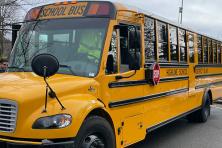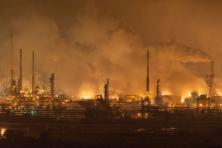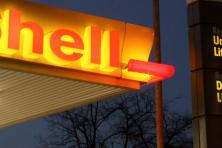We’re confronted with it every day, in the news and in our own experience: disruption, illness, economic instability, and uncertainty. The scale of what we are facing together can be hard to comprehend, overwhelming, devastating. Protecting ourselves and our communities and mitigating harms while building more resilient systems will be difficult, though it is achievable. We will need to listen to experts and craft responses at the appropriate scale. We must make sure that crucial resources are there for low-income communities and communities of color disproportionately impacted by illness and economic strife. We are losing a lot. But rebuilding from such a crisis opens up possibilities for addressing long-standing harms and systemic flaws, for creating new, good jobs, for ensuring justice for communities that have long been denied it.
Of course I’m talking about the COVID-19 pandemic. I am also talking about the climate crisis.
During times like these, it can feel hard to bring up the climate conversation. Why should I talk about an abstract issue when people are suffering right now? However, the premise that question is based on is flawed: it assumes that the impacts from the climate crisis will be felt in the future and that people are not suffering from climate pollution today. The truth is, those impacts are being felt right now and we are suffering from the climate crisis today. Just as health experts warned us of a pandemic, scientists tell us that we’re feeling climate impacts now, impacts that will continue to grow much worse over time, even if we don’t always connect the dots. We need to talk about climate and coronavirus.
It’s never “not the time” to talk about climate because we are out of time.
— Mary Annaïse Heglar (@MaryHeglar) April 16, 2020
Even as many of us struggle with fear, our health, and our finances during this time--and for many, this struggle is nothing new--big polluters are not holding any punches. While some of us both literally and figuratively struggle to breathe, Big Oil has been pressuring the Environmental Protection Agency (EPA) to roll back regulations that keep communities safe from toxins. The American Petroleum Institute “asked for a suspension of rules that require repairing leaky equipment as well as monitoring to make sure pollution doesn't seep into nearby water,” and their requests were granted as the EPA suspended enforcement of standards that protect our health. The Washington State building industry is even now trying to secure a delay in updating our state energy codes which save residents money on heating and cooling. And just a couple months after lobbying Washington’s legislature to oppose the Clean Fuel Standard, disingenuously claiming that it would cause painful cost increases at the gas pump, the oil industry successfully pleaded with the federal administration to cut global oil production in order to increase gas costs for the purpose of protecting oil industry profits. Polluters have simply never cared about our health, our safety, or whether we can afford the unsustainable energy they sell--they care about their profits and shareholders returns. They are happy to use the pandemic as an excuse to steamroll any hard-fought progress. We don’t have a choice but to talk about the climate and our health right now.
The reality of the climate crisis and the pandemic also means it doesn’t make sense not to talk about climate if we really want to address the situation before us. A recent Harvard University study determined that even a small increase in the amount of long-term exposure to air pollution leads to a large increase in the COVID-19 death rate. Pediatrician Dr. Aaron Bernstein notes, “if we stop putting out so much pollution, we lead healthier lives right away.” Communities of color are more likely to suffer from the outputs of polluting industries as they are sited near their homes. As a result of greater exposure to pollution, which is then compounded by other health disparities and structural inequities, members of these communities are disproportionately dying from COVID-19. As Green New Deal author Rhiana Gunn-Wright puts it, “the same populations that are bearing the brunt of the health and economic effects of the coronavirus are the same populations that bear the brunt of fossil fuel pollution — which, in turn, makes them more vulnerable to serious complications.” If we want to address this, we need to address the scourge of air pollution--which even before the pandemic, was causing over 4 millions deaths a year. We need to talk about that, which means we need to talk about climate change.
Thus, the question we should ask is: who benefits if we hold off on talking about climate and agitating for change? Not those currently suffering from illness, and due to increasing pollution, future cases of COVID-19 and other respiratory infections will be even worse. Who makes money from us respectfully waiting our turn? Not homeowners and renters whose residences force them into using more energy than needed through building inefficiencies; not drivers who fuel up with gasoline the oil industry continues to conspire to make more expensive. The beneficiary of our concerned silence has not changed for the last century and a half--it’s the fossil fuel industry. It’s the companies that pull oil, gas, and coal out of the ground and those who fight in Olympia and D.C. to make it harder for us all to switch to cleaner options. They benefit, while we continue to suffer from escalating impacts.
Climate change-causing air pollution is killing us now, both in conjunction with COVID-19 and on its own, making climate change an emergency, not a far-off threat that we can wait to address. Air pollution isn’t even the only way that climate change is hurting and killing us today. Hurricanes, droughts, and fires, all of which are exacerbated by climate change, have been intensifying and wreaking havoc year after year, destroying homes and lives. And once again, those with the fewest resources are hit the hardest, and are least able to bounce back. Two and a half years ago, Hurricane Maria, one of the most intense hurricanes recorded, hit Puerto Rico. The storm killed thousands and left many without homes, electricity, and running water. It is estimated that the hurricane had a $43 billion impact on the economy, in a place where 45% of people live below the poverty line. How can we slow the spread of coronavirus when people don’t have the resources to stay home, or even have homes to stay in? When they do not have access to clean water to wash with? And, how do we respond safely to natural disasters amidst a pandemic, as people are being evacuated and as first responders report to the scene? Climate change is both a cause and an amplifier of suffering. And we need to talk about it to address it.
Whether or not we talk about climate change, it will happen. To paraphrase Bill McKibben, physics won’t wait for us to address the COVID-19 crisis before we address climate change, just as viruses don’t care about our preparedness. They just are. We cannot negotiate with either; we have to react to both. Not taking action on climate now will only lead to more suffering now and in the immediate future. Talking about climate action right now isn’t opportunism; it’s realism. The polluters aren’t on pause, and neither is physics.
Our responses to the climate crisis and to COVID-19 can and should be intertwined. Dr. Bernstein emphasizes that “climate solutions are pandemic solutions.” Furthermore, in our recovery from the pandemic we have the opportunity to also mitigate the climate crisis by investing in vulnerable communities, creating good jobs, building green infrastructure, producing clean energy, and cleaning our air--all of which would have immediate benefits. Gunn-Wright asks, “Why is it ‘opportunism’ when we try to design policy that would address more than one problem at a time, but it’s ‘efficiency’ when businesses do the same?” We have the ability to address two crises at once, together, and to ensure a more stable future by addressing the shortcomings of our current systems. After all, why would we want to put people back to work in dirty jobs? Why would we want to create more harmful air pollution instead of reduce it? What good does it do to double down on a dirty economy and on inequitable systems that have failed us, and would do so again?
COVID-19 has caused a lot of harm, and it will cause more. We can say the same about climate change. These crises are interrelated, with climate pollution amplifying our health emergency. We need to talk about climate and COVID-19 so we can build a clean economy and healthier communities together.





